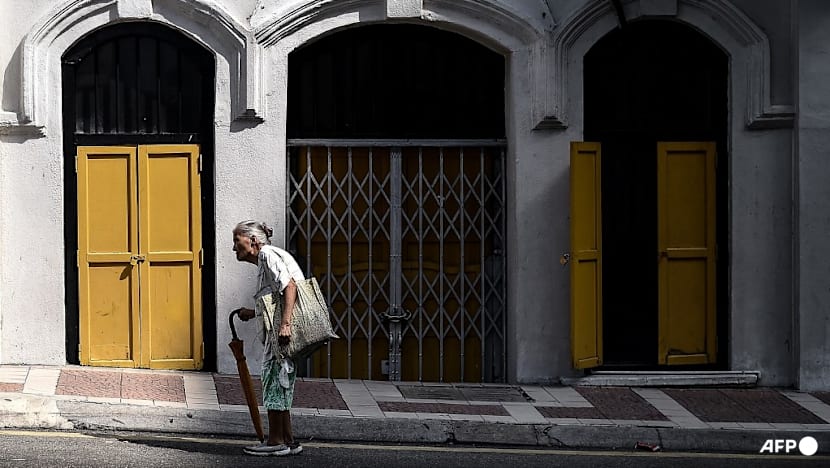World Bank calls on Malaysia to ‘significantly expand’ social pensions amid ageing population
The World Bank report noted that while EPF - which is Malaysia’s retirement fund - contributions have improved in volume and scope, overall retirement savings adequacy remains a critical problem.

An elderly woman waits for a bus in downtown Kuala Lumpur, Malaysia. (File photo: AFP/Manan Vatsyayana)
KUALA LUMPUR: Malaysia could face an elderly care crisis unless it boosts funding to widen social pension coverage, the World Bank warned in a report published on Thursday (Oct 30).
It noted that Malaysia has one of the lowest social pension coverage in the world, with coverage of social pensions as a percentage of the population aged 65 and above at just under 10 per cent.
The report titled “Should Malaysia expand its social pension? Global evidence, design issues and options” said that Malaysia’s population aged 65 and over is projected to reach a fifth by 2056.
“Malaysia’s population is ageing rapidly, but its social pension coverage and adequacy are relatively low,” the report’s authors Philip O’Keefe and Gerton Rongen wrote.
“By 2045, 14 per cent of Malaysia’s population will be 65 or older, rising to 20 per cent by 2056. However, Malaysia’s social pension (Bantuan Warga Emas, BWE) currently covers only around 4 per cent of the elderly - among the lowest rates globally.”
O’Keefe is a professor at the University of New South Wales while Rongen is a doctorate candidate at Vrije Universiteit Amsterdam.
They define social pensions as transfers to the elderly that are financed by general government revenues - meaning they do not require a contribution from the recipient and are typically offered to eligible citizens, often defined by age or income.
Malaysia is an ageing society, based on the United Nations’ definition of one where at least 7 per cent of the population are aged 65 and above.
It is considered an aged society if this ratio exceeds 14 per cent and “super aged” - when the share reaches 21 per cent - by 2056.
At the launch of the report on Thursday, World Bank country manager Judith Green said that Malaysia’s population is projected to transition to an aged society by the mid-2040s, and then to a super-aged nation by the mid-2050s.
“This transition from an ageing society to a super-aged nation will take place at a pace similar to that observed in other Asian countries, such as China and Japan, but much faster than in other developed countries,” she was quoted as saying by news agency Bernama.
She added that on average, the accumulations of Employees Provident Fund (EPF) – which is Malaysia’s retirement fund - numbers are low and typically run down within three- to five years of withdrawal.
Therefore, Green noted that social pensions are the last line of defence and safety net, and that she indeed sees a growing number of countries introducing or expanding their social pensions, given similar challenges.
“Global evidence has shown that social pensions have a positive impact on reducing poverty. Malaysia is not only facing demographic transition challenges, but there are valuable lessons that can be learnt from global experiences in redesigning and expanding social pensions,” she said.
The World Bank report noted that while EPF contributions have improved in volume and scope, overall retirement savings adequacy remains a critical problem.
In 2023, the fund warned nearly 50 per cent of contributors reaching age 55 had less than RM10,000 in their savings, far below the modestly estimated RM250,000 needed to retire.
And just last year, Malaysia restructured the EPF with members now having three accounts compared with the previous two, with a new “flexible” one where funds can be easily withdrawn to meet short-term needs.
The World Bank, thus, called on Putrajaya to “significantly” expand social pension coverage, either through existing programmes or new ones.
The expansion should begin with 40 per cent of the lowest income earners and would require revising the income eligibility and the payouts to be indexed to inflation for benefits to retain their real value.
With rising life expectancy, Malaysia should also consider raising the eligibility age for social pensions to at least 65 years old and linking its future level automatically to increases in life expectancy, the report added.
Under Budget 2026, Malaysia has allocated RM1.26 billion towards welfare for seniors, and this is expected to benefit 180,000 elderly people through pocket money, socio-economic assistance and activity centres.
Separately, World Bank Group senior economist Matthew Dornan said that wider social pension coverage would complement the country’s existing contributory schemes, such as EPF and pension benefits for civil servants, which currently do not reach all Malaysians or ensure adequate retirement savings.
“Social pensions, which are tax-financed support for older persons, have been successfully implemented in about 100 countries globally. They serve as an important safety net for those with inadequate or no retirement savings,” he said, according to Bernama.


















